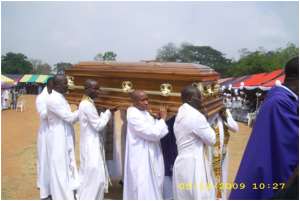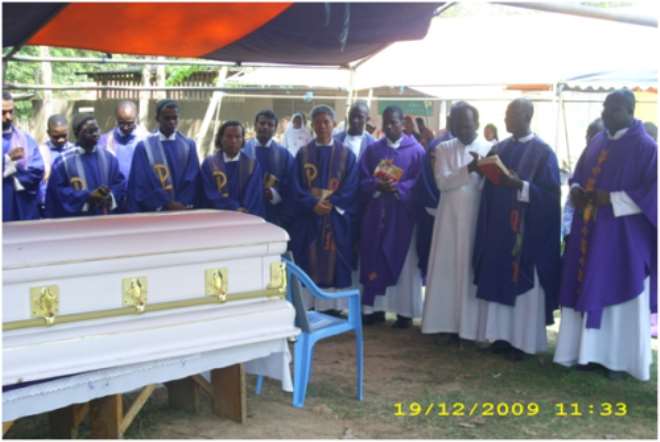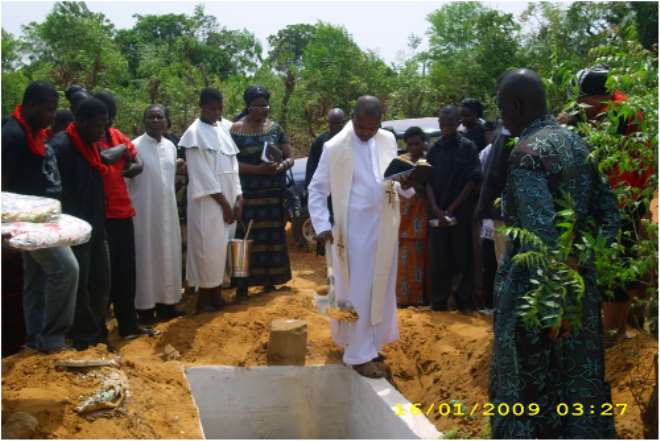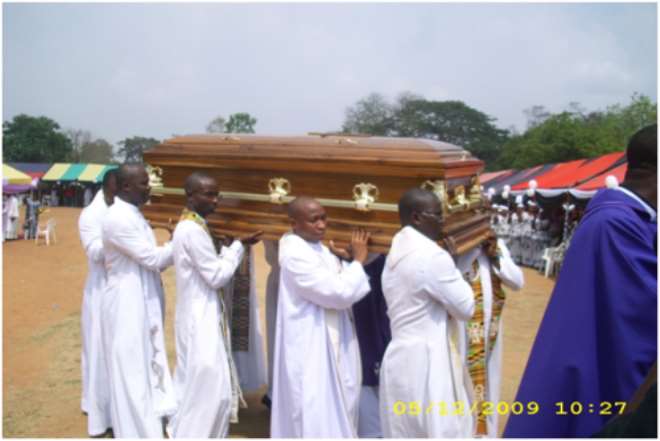
For one worrying phenomenon creeping into the social fabric of the Ghanaian society these days is the way funerals are becoming competitive festivals at which wealth is lavishly displayed leaving huge debts on the heads of the bereaved families. It is a common phenomenon from a tribal approach to see how the dead is buried.
Interestingly, a funeral is a time to both mourn and celebrate life. I am wondering whether funeral rites were times for mourning or rejoicing. Funerals have always been the main public social among Ghanaians but the growing funeral business significantly alters the way death is celebrated.
The crave by Ghanaians to mount lavish funeral ceremonies, has always surfaced for public debate. In most Tribes, funeral events are held each week. These go with lavish spending on ambulances, food, drinks, and the hiring of loud speakers; expensive clothes of different kinds are also displayed at the funeral for show off as some also take advantage of the funeral to steal and involve in immoral activities such as dating and romance.
Every Saturday is funeral day. In every mid-sized town there are two or more funerals. Hundreds of people come together to pay their last respects to a deceased loved one, or to sympathize with a bereaved friend. People dress up and travel to attend a funeral in another town or village. In turn, they expect the bereaved family to entertain them with music, dance, drinks, and sometimes food.
In the evening, it can be hard to find transport back to town, when trotro (minibuses for public transport) are stuffed with funeral guests going home. And every Saturday night people dressed in black and red funeral cloth flock together in Hotel de Kingsway to end the day's funeral by dancing to the tunes of highlife music. Funerals are at the heart of Ghanaian culture and social life.
One could expect a traditional ritual, centered around the extended family and around beliefs about death and ancestorship, to reduce in importance under the influence of individualisation, urbanisation, the market economy, and Christianity. The opposite scenario is taking place in Ghana. Funerals are, more than any other ceremony, increasingly gaining in scale and importance.
It is almost universally acknowledged that Ghanaians adore the dead and will commit so much to performing expensive and flamboyant funeral rites. This practice is as old as the earliest history books and contemporary as the morning newspapers.
The dimension which contemporary Ghanaian funerals have assumed over the last decade gives a great cause for concern if not worry. Whilst in other parts of the world people are busily working hard sometimes seven days in a week, some people in Ghana spend time on the non-essentials- celebrating one week celebrations, final funeral rites, forty day celebration of the dead.
On March 9, 2011, the Catholic Archdiocese of Kumasi banned the buying of special clothes for the One Week celebration and final funeral rites as well as the thanksgiving service by families and sympathizers of its bereaved members.
The ban is of a result of new regulations issued by the Catholic Archdiocese of Kumasi concerning celebration of funerals for its members. The purpose of the funeral regulations, according to Rev. Fr. Michael Sarfo Katanka, Director of Communications of the Archdiocese was to make the Resurrection of the dead and the Life of the World to come truly the centre of Christian funeral and also to make it less burdensome by reducing ostentation and the cost involved in the celebration.
The regulations were put together by a funeral committee set up by the Metropolitan Catholic Archbishop of Kumasi, Most Reverend Thomas K. Mensah and aims at returning funerals in the Catholic Archdiocese of Kumasi to their simple Akan and Christological origins.
The Archdiocese has also banned the arrangement and display of things in a convoy known as 'adekyeredee' during funerals of church members. With regard to adesiedee only the essentials like rings and handkerchiefs and a very small amount of money shall be allowed. Adwaredee will be accepted on condition that the items will be directly used on the corpse.
Other activities banned by the regulations include changing of clothing on the corpse during laying in state and the laying of wreaths.
The serving of food and drinks during the one week celebration of a deceased member has also been abolished. Only water shall be served. Similarly, during the burial and final funeral rites food and drinks shall not be served except to mourners and sympathizers who have travelled far and early. Food shall not be served at all in the afternoon. However water and soft drinks may be served.
The regulations also insist that brochures for Requiem Masses of deceased members should have only the picture of the deceased, a general programme of the Mass, the biography and one or two tributes but only one shall be read together with the biography.
The regulations also limit the keeping of the corpse at the morgue to not more than forty days.
On donations, the regulations stipulate that they may be made during the final funeral rites and in the case of the one-week celebrations they may be made without public announcements.
In order to respect the Sunday, the day of the Resurrection, one week celebrations falling on Sundays shall be transferred to either the day before or the following day, if that would not cause grave inconvenience for the family. Also the regulations state that the final funeral rites shall end with Thanksgiving Mass on Sunday.
To give respect to traditional authorities the regulations emphasize that bereaved families are entreated to observe traditional council regulations where they are in place.
The regulations call for close collaboration between the Church and the family of any deceased member in organizing funeral celebrations to ensure their smooth enforcement.
Sanction for any breaches of the regulations shall be Church members refusal to attend the funeral as a group and in the name of the Church.
Surprisingly, our politicians,( from the President in the Castle to the Unit Committee Chairman in Alakple my hometown) attend funerals almost every weekend. Consciously or unconsciously, Ghanaians seem to measure the efficiency of a Minister or Member of Parliament by the number of funerals he or she attends every weekend and the donations made to the bereaved families.
Without any reservation, I must state from the onset that, Ghanaians spend more money on funerals than on weddings. One cannot imagine that some tribes and families spend as much as between 70 and 150 million cedis of funerals. Any time you travel along the highway, you will see people clad in black, brown, and burgundy colors in every town, village and hamlet. These are the traditional mourning clothes by Ghanaians when someone commits suicide, dies in battle or is shot dead in any way. There are occasions when some wear white when someone lives to a ripe old age.
Usually, when a person dies, the immediate relatives in the town or village are summoned to a meeting where they are informed of the passing. In modern times, with advent of refrigeration, with the exception of the villages, bodies are deposited in the mortuary if the person died at home, or if in the hospital, that is automatic. An autopsy will be conducted. After that, the family may leave the body in the mortuary for so long as long as they have money to pay for the mortuary fees.
In the interim, messages will be sent to all relatives far and near. If there are children and siblings outside the country, they will be informed. A week after the death, the family will gather to celebrate; this is the time when they will decide on burial arrangements. In some tribes like the Akan group, a family does not refer to mother and father but means people on your mother's side (matrilineal), hence the body belongs to them.
Depending on where children and siblings are, the burial may take place in a short time or they'll wait for those outside to return to the country. If outside relatives are returning, then it may take a longer time. When the date is set, usually the ancestral family home will be painted with a fresh coat of paint. Everything will be spruced up because visitors will be coming.
Burials normally take place towards the weekend. On the day before the burial, the body will be retrieved from the mortuary and brought to the family house. Special family women who are versed in handling dead bodies, popularly called undertakers, will do the bathing and preparation. The body will be laid in state and family members will keep vigil over it. Visitors will file past it and stay for a period.
The coffins that are manufactured are brightly colored, elaborate and festive. Often called "fantasy coffins", they represent something about how the deceased lived. Coffins are created in the form of fish, animals, cars, bottles, Bibles, and any other object requested. A fisherman may get a fish coffin; a carpenter, a hammer; or a photographer, a camera. Someone devout may choose a Bible. Vices like beet bottles and cigarettes are also used.
This different posture of laying corpse is very disturbing to an extent that it has now become a fashion. Some are laid to indicate the kind of work they did before their death, including standing with a hand on sewing machine to indicate that the person was a seamstress or tailor.
Some are laid to stand beside a table, holding tools of a carpenter; sit down near an old gear box indicating that the deceased was a mechanic; sit on a chair holding an impoverished steering wheel, indicating that that he was a driver before death. According to Rev. Fr. Francis Homatekpor of the Ho Diocese, the new phenomenon of laying corps, is only subjecting the dead person to further agony, because someone who passes away is sleeping in the Lord.
With the advent of Christianity, church services have been added. The burial may take place on a Friday or Saturday. The body will be taken to a church where the funeral services will take place. After which it will be interred at one of the cemeteries. Upon return, the family will gather in front of the family house or on a soccer field to hold the funeral celebrations. Here, guests will be served with drinks, music will be played, and people will dance to celebrate the life of the deceased. There will be special tables set aside where people will make financial donations to the family to help defray the cost of the funeral.
On the Sunday, if they are Christians, they will go to church for a thanksgiving and memorial service. After service, the family and visitors will gather at a hall where they will be treated to some tasty meals. At the end of that those who travelled from afar will ask permission to leave.
A few years back, we never heard of 'take away' packages at funerals but now they are very much in vogue and if one does not include it in funeral expenditure, it is as if one is looked down upon. Should funerals be a time to display one's opulence and pedigree and must we follow other if we cannot afford?
Forty days later, the family will gather for the forty day celebration. Research has shown that some Ghanaians used to have the ninety day celebration but that is currently out of style. A year later, the first anniversary is celebrated.
Before funerals are held, it is a common sight along the major roads to be hit by huge clourful billboards advertising funeral arrangements. These billboards which are also expensive range from 1,000 to 5,000 Ghana cedis depending on the size. Of late in Ghana, these billboards are gradually surfacing on the skyline of the Nation's capital, Accra where huge billboards are erected at strategic locations announcing funeral arrangements. They are so conspicuous that no one who takes some particular route misses it.
The multi million question asked by people is that is it that those billboards denote affluence, class, ostentatious living or otherwise? Enquiries had revealed that especially in Accra, it is believed that families that put up such funeral billboards might have relations who work in an advertising agency who freely donate these billboards to serve as a forceful reminder to relations, friends and well wishers, than other forms of advertisements such as invitation cards which can be easily misplaced.
Based on the lavish way Ghanaians spend on funerals, they have to change certain habits and lifestyle to move the nation forward in the right direction. On such instance that needs serious attention is the expensive manner in which people celebrate funerals.
Obviously, too much time, energy and resources are spent in organizing and celebrating funerals. As stated above, dead bodies are left for long period at the morgue to enable families to mobilize resources for an eventual 'big time' and expensive burial.
Apart from expensive coffins, bereaved families go in for expensive clothing at times two different types to show off at such funerals. Some go to an extent of hiring bands to make the occasion glamorous. But unfortunately, some of the dead on who much is spent are not given proper attention and care when they were alive. The notion one gets from such selfish display of affluence is that Ghanaians now honour or prefer the dead than the living.
In a debate on the floor of Parliament in 2007, Mr. Alban Bagbin, is reported to have said that 'we are investing in the dead rather than the living through expensive funerals and that is bad'. He added that the dead should be given decent and not expensive burials knowing very well that whatever was done to the dead it was destined for the grave.
On the same issue, Honourable Alfred Agbesi, the Member of Parliament for Ashiaman, who revealed that he had bought 13 pieces of mourning cloths in one year, called for the introduction of one cloth for all funeral, arguing among other things that, 'after spending on expensive cloths, coffins and keeping the corpse in expensive morgues, the widow and children are left with nothing and are expected to fend for themselves.'
Must we fritter away money on funerals if we cannot afford to do so only to discover that we have plunged the family into debt while the money used could have been spent on education of the deceased children?
One interesting observations is that most women spend lavishly on funerals to the detriment of the welfare of their children. Most Rev. Gabriel Charles Palmer-Buckle, Archbishop of Accra, has over the years and even now spoken against expensive funerals and had rather encouraged Ghanaians to set up endowment funds for their dead relatives to immortalize them instead of spending extravagantly during their funerals.
'The surest way to remember the dead is not the type of coffins used to bury them nor is not the type of cloth or 'T'shirt won during their funerals but doing something positive for the dead which would benefit the living', the archbishop noted. This clarion appeal to wealthy families to set up endowment funds will serve as a more lasting monument to the dead as their poor relatives could receive bursaries to further or complete their education.
The Ghana Catholic Bishops' Conference (GCBC) in 1997 decried the huge sums of money spent on funerals, stating that 'while we encourage respect for the dead, we appeal to Ghanaians to exercise moderation with regard to funeral expenditure and rather use the money on living relatives.'This moderation was indeed exhibited at the Funerals of Cardinal Peter Dery in 2008 at Tamale and Most Rev. Lucas Abadamloora, who was the President of the GCBC, this year at Bolgatanga.
Ghana has been cited as a classical example of committing so much to funerals to the extent that some take loans for funerals just to give an impression of affluence whilst leaving bereaved families with mountains of debt.
The funeral of the late revered Pope John Paul II teaches us a number of lessons of how the Catholic Church discourages expensive funerals. As telecasted in 2005 at the Vatican, he was buried in a simple rectangular wooden coffin placed on the floor instead of expensive casket as we see at many funerals. The Moslems take few hours to bury their dead as well as some churches that result to cremation three days after the death of a member.
Inasmuch as one would not be against the dead being accorded a befitting burial, many concerns lie in the way some bereaved families go about the funerals. However, it is the utmost responsibility of Ghanaians to take care of the aged, keeping in mind that one day they would also need the same care in their old age.
In Ghana, now, it is a well noted prevalent attitude of people not to take care of the aged but spend huge sums of money on elaborate funerals for the very people they were supposed to cater for during their life time. From the youngest to the older ones, we are all ordained by God to give a helping hand to people especially the poor and the disadvantaged to make life comfortable for them.
Every Ghanaian know that funerals are performed to bid farewell to the departed one, but do not know that it costs the nation many man hours and low labour productivity as many workers leave on Fridays for funerals and perhaps return Monday afternoon or Tuesday morning which resulted in the dismissal of some of them.
Some progressive Churches and religious organizations have banned wake keeping, sale and serving of alcoholic drinks and buying of new cloths for every new funeral just to cut down cost.
We must always have it at the back of our mind that whatever we spend in heightening the burial of a deceased relative cannot revive him to life. He cannot return to life and it is therefore a waste on the so called befitting burial.
The time has come for to reduce funeral expenses and leave enough money for orphans, widows, widowers and other members of bereaved families. It is never too late for Chiefs, opinion leaders, Churches and Religious organizations and other influential people in society, to intensify their call to Ghanaians to reduce funeral bills.
Ghanaians must take a cue from the words of the immediate past Director-General of the Ghana Health Service, Professor Agyeman Badu Akosa that we should pay more attention to healthy living and give priority to our health instead of spending all our resources on expensive funerals.
 NEW PICTURE (2)
NEW PICTURE (2)
 NEW PICTURE (3)
NEW PICTURE (3)
 NEW PICTURE (4)
NEW PICTURE (4)
 NEW PICTURE (5)
NEW PICTURE (5)
 NEW PICTURE (6)
NEW PICTURE (6)
 NEW PICTURE (7)
NEW PICTURE (7)




 This IMANI job no dey pap; the people you are fighting for are always fighting y...
This IMANI job no dey pap; the people you are fighting for are always fighting y...
 Prof. Naana Opoku-Agyemang has changed; you can see a certain sense of urgency –...
Prof. Naana Opoku-Agyemang has changed; you can see a certain sense of urgency –...
 MFWA Executive Director slams Akoma FM for engaging in ‘irresponsible’ media pra...
MFWA Executive Director slams Akoma FM for engaging in ‘irresponsible’ media pra...
 ‘Women must become millionaires too’ — Prof Jane Naana on establishment of Women...
‘Women must become millionaires too’ — Prof Jane Naana on establishment of Women...
 Some believe only in Ghanaian votes, not Ghana — Kofi Asare jabs politicians
Some believe only in Ghanaian votes, not Ghana — Kofi Asare jabs politicians
 Plan to make BEST sole aggregator of Sentuo Oil Refinery will create market chal...
Plan to make BEST sole aggregator of Sentuo Oil Refinery will create market chal...
 2024 elections: I can't have the man I removed from office as my successor — Aku...
2024 elections: I can't have the man I removed from office as my successor — Aku...
 2024 Elections: Immediate-past NPP Germany Branch Chairman garners massive votes...
2024 Elections: Immediate-past NPP Germany Branch Chairman garners massive votes...
 Gov’t focused on making Ghana energy self-sufficient, eco-friendly – Akufo-Addo
Gov’t focused on making Ghana energy self-sufficient, eco-friendly – Akufo-Addo
 April 25: Cedi sells at GHS13.74 to $1, GHS13.14 on BoG interbank
April 25: Cedi sells at GHS13.74 to $1, GHS13.14 on BoG interbank
